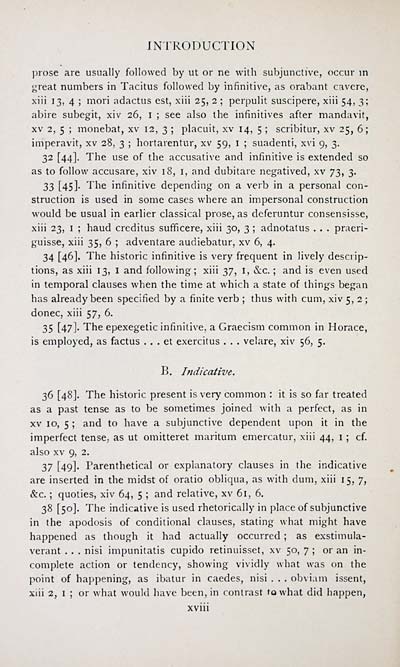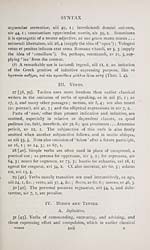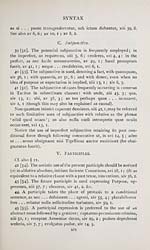Download files
Complete book:
Individual page:
Thumbnail gallery: Grid view | List view

INTRODUCTION
prose are usually followed by ut or ne with subjunctive, occur in
great numbers in Tacitus followed by infinitive, as orabant cavcre,
xiii 13, 4 ; mori adactus est, xiii 25, 2 ; perpulit suscipere, xiii 54, 3;
abire subegit, xiv 26, I ; see also the infinitives after mandavit,
XV 2, 5 ; monebat, xv 12, 3 ; placuit, xv 14, 5 ; scribitur, xv 25, 6;
imperavit, xv 28, 3 ; hortarentur, xv 59, i ; suadenti, xvi 9, 3.
32 [44]. The use of the accusative and infinitive is extended so
as to follow accusare, xiv 18, i, and dubitare negatived, xv j^, 3.
33 [45]- The infinitive depending on a verb in a personal con-
struction is used in some cases where an impersonal construction
would be usual in earlier classical prose, as deferuntur consensisse,
xiii 23, I ; baud creditus sufficere, xiii 30, 3 ; adnotatus . . . praeri-
guisse, xiii 35, 6 ; adventare audiebatur, xv 6, 4.
34 [46]. The historic infinitive is very frequent in lively descrip-
tions, as xiii 13, I and following; xiii 27, i; "Src. ; and is even used
in temporal clauses when the time at which a state of things began
has already been specified by a finite verb ; thus with cum, xiv 5, 2 ;
donee, xiii 57, 6.
35 [47]. The epexegetic infinitive, a Graecism common in Horace,
is employed, as factus . . . et exercitus . . . velare, xiv 56, 5.
B. Indicative.
36 [48]. The historic present is very common : it is so far treated
as a past tense as to be sometimes joined with a perfect, as in
xv 10, 5 ; and to have a subjunctive dependent upon it in the
imperfect tense, as ut omitteret maritum emercatur, xiii 44, i ; cf.
also XV 9, 2.
37 [49]. Parenthetical or explanatory clauses in the indicative
are inserted in the midst of oratio obliqua, as with dum, xiii 15, 7,
&c. ; quoties, xiv 64, 5 ; and relative, xv 61, 6.
38 [50]. The indicative is used rhetorically in place of subjunctive
in the apodosis of conditional clauses, stating what might have
happened as though it had actually occurred ; as exstimula-
verant . . . nisi impunitatis cupido retinuisset, xv 50, 7; or an in-
complete action or tendency, showing vividly what was on the
point of happening, as ibatur in caedes, nisi . . . obviam issent,
xiii 2, I ; or what would have been, in contrast to what did happen,
xviii
prose are usually followed by ut or ne with subjunctive, occur in
great numbers in Tacitus followed by infinitive, as orabant cavcre,
xiii 13, 4 ; mori adactus est, xiii 25, 2 ; perpulit suscipere, xiii 54, 3;
abire subegit, xiv 26, I ; see also the infinitives after mandavit,
XV 2, 5 ; monebat, xv 12, 3 ; placuit, xv 14, 5 ; scribitur, xv 25, 6;
imperavit, xv 28, 3 ; hortarentur, xv 59, i ; suadenti, xvi 9, 3.
32 [44]. The use of the accusative and infinitive is extended so
as to follow accusare, xiv 18, i, and dubitare negatived, xv j^, 3.
33 [45]- The infinitive depending on a verb in a personal con-
struction is used in some cases where an impersonal construction
would be usual in earlier classical prose, as deferuntur consensisse,
xiii 23, I ; baud creditus sufficere, xiii 30, 3 ; adnotatus . . . praeri-
guisse, xiii 35, 6 ; adventare audiebatur, xv 6, 4.
34 [46]. The historic infinitive is very frequent in lively descrip-
tions, as xiii 13, I and following; xiii 27, i; "Src. ; and is even used
in temporal clauses when the time at which a state of things began
has already been specified by a finite verb ; thus with cum, xiv 5, 2 ;
donee, xiii 57, 6.
35 [47]. The epexegetic infinitive, a Graecism common in Horace,
is employed, as factus . . . et exercitus . . . velare, xiv 56, 5.
B. Indicative.
36 [48]. The historic present is very common : it is so far treated
as a past tense as to be sometimes joined with a perfect, as in
xv 10, 5 ; and to have a subjunctive dependent upon it in the
imperfect tense, as ut omitteret maritum emercatur, xiii 44, i ; cf.
also XV 9, 2.
37 [49]. Parenthetical or explanatory clauses in the indicative
are inserted in the midst of oratio obliqua, as with dum, xiii 15, 7,
&c. ; quoties, xiv 64, 5 ; and relative, xv 61, 6.
38 [50]. The indicative is used rhetorically in place of subjunctive
in the apodosis of conditional clauses, stating what might have
happened as though it had actually occurred ; as exstimula-
verant . . . nisi impunitatis cupido retinuisset, xv 50, 7; or an in-
complete action or tendency, showing vividly what was on the
point of happening, as ibatur in caedes, nisi . . . obviam issent,
xiii 2, I ; or what would have been, in contrast to what did happen,
xviii
Set display mode to: Large image | Transcription
Images and transcriptions on this page, including medium image downloads, may be used under the Creative Commons Attribution 4.0 International Licence unless otherwise stated. ![]()
| Early Gaelic Book Collections > Matheson Collection > Cornelli Taciti annalium > (22) |
|---|
| Permanent URL | https://digital.nls.uk/76567197 |
|---|
| Description | Items from a collection of 170 volumes relating to Gaelic matters. Mainly philological works in the Celtic and some non-Celtic languages. Some books extensively annotated by Angus Matheson, the first Professor of Celtic at Glasgow University. |
|---|
| Description | Selected items from five 'Special and Named Printed Collections'. Includes books in Gaelic and other Celtic languages, works about the Gaels, their languages, literature, culture and history. |
|---|

